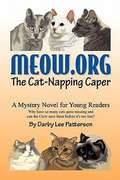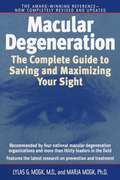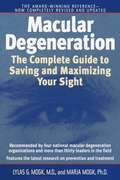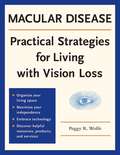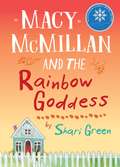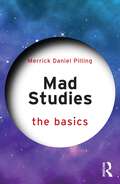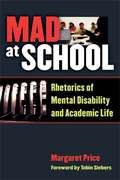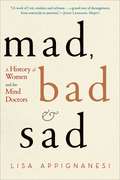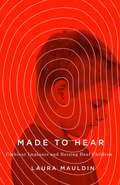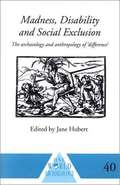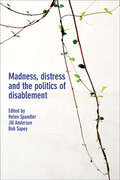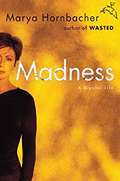- Table View
- List View
MEOW.ORG: The Cat-Napping Caper
by Darby PattersonThe Crew is a group of four friends that get together to solve mysteries. The four heroes have different physical disabilities, but use their teamwork and talent to investigate cases. In MEOW.ORG, they investigate the sudden disappearance of a number of foster cats.
Macular Degeneration: The Complete Guide to Saving and Maximizing Your Sight
by Lylas G. Mogk Marja MogkDr. Lylas Mogk has a unique personal and professional understanding of AMD. This book explains how to successfully manage and limit its effect on a person's life.
Macular Degeneration: The Complete Guide to Saving and Maximizing Your Sight
by Lylas G. Mogk Marja MogkThe acclaimed book on macular degeneration--now completely revised and updated with cutting edge research and the latest developments in the field.More than fifteen million Americans have age-related macular degeneration (AMD), and the disease will strike 200,000 more people this year. It is the most prevalent cause of vision loss in the western world. Dr. Lylas Mogk, the founding director of the Visual Rehabilitation and Research Center of the Henry Ford Health System, has a unique professional and personal understanding of AMD. A doctor and loving daughter of a parent with this frightening though manageable condition, Mogk here explains exactly what it is and how to limit its effect on your life. Reassuring and comprehensive--complete with illuminating first person stories of people with AMD--Macular Degeneration will help you or someone you love with information on* Reducing your risk factors* Revolutionary new technology, including laser surgery and alternative treatments* New research discoveries in nutrition--and eye-healthy recipes* The latest low-vision computer software programs* Coping with depression and frustration* Active online communities of people with macular degeneration Plus a Low Vision Living Rehab program to help you read better, see better, and live independently!From the Trade Paperback edition.
Macular Disease: Practical Strategies for Living with Vision Loss
by Peggy R. WolfeThis invaluable guide to living well with vision loss is the perfect blend of abundant factual material and real-life experience. The book's positive, take-charge approach offers reassurance, hope, and hundreds of proven techniques, strategies, and tips for both the newly diagnosed and those at later stages of their disease. "My Story" vignettes in each chapter describe the author's fears, foibles, and triumphs in challenging situations. Readers will identify with the author's experiences and be encouraged by knowing she successfully traveled the same path.
Macy Mcmillan and the Rainbow Goddess
by Shari GreenWinner of the 2018 ALA Schneider Family Middle School Books Award. Sixth grade is coming to an end, and so is life as Macy McMillan knows it. Already a "For Sale" sign mars the front lawn of her beloved house. Soon her mother will upend their perfect little family, adding a stepfather and six-year-old twin stepsisters. To add insult to injury, what is Macy's final sixth grade assignment? A genealogy project. Well, she'll put it off - just like those wedding centerpieces she's supposed to be making.Just when Macy's mother ought to be understanding, she sends Macy next door to help eighty six-year-old Iris Gillan, who is also getting ready to move - in her case into an assisted living facility. Iris can't pack a single box on her own and, worse, she doesn't know sign language. How is Macy supposed to understand her? But Iris has stories to tell, and she isn't going to let Macy's deafness stop her. Soon, through notes and books and cookies, a friendship grows. And this friendship, odd and unexpected, may be just what Macy needs to face the changes in her life. Shari Green, author of Root Beer Candy and Other Miracles, writes this summer story with the lightest touch, spinning Macy out of her old story and into a new one full of warmth and promise for the future.
Mad Studies: The Basics (The Basics)
by Merrick Daniel PillingMad Studies: The Basics provides an introductory account of a field that emerged from, and must remain grounded within, community knowledge, activism, and the perspectives of those who have experienced madness and mental health systems.It is a concise text that introduces the field through an exploration of some origins of Mad Studies, as well as two interrelated queries: what does Mad Studies help us understand, and what does Mad Studies help us do? This exploration reveals that Mad Studies is an interdisciplinary, intersectional, and multi-vocal field that demands different answers to the very meaning of the beliefs, behaviours, and bodymind experiences that are currently characterized as being indicative of mental illness. At the heart of Mad Studies is a liberationist desire to resist, transform, and abolish the systems that create marginalization, and implement responses to madness that are grounded in the collective knowledge of those deemed Mad. This book shows that the contributions of Indigenous, Black, racialized, queer, and trans people must be understood as central to, and already embedded within, Mad Studies and activism rather than as add-ons, expansions, or efforts to make Mad Studies more inclusive.It will be of interest to all scholars and students of disability studies, social work, gender studies, education, health sciences, sociology, and psychology, as well as practitioners in mental health care, and those with lived experience of madness and mental health systems.
Mad at School: Rhetorics of Mental Disability and Academic Life
by Margaret PriceMad at School explores the contested boundaries between disability, illness, and mental illness in the setting of U.S. higher education. Much of the research and teaching within disability studies assumes a disabled body but a rational and energetic (an 'agile') mind. In Mad at School, scholar and disabilities activist Margaret Price asks: How might our education practices change if we understood disability to incorporate the disabled mind?
Mad, Bad and Sad: A History of Women and the Mind Doctors
by Lisa AppignanesiThis fascinating history of mind doctors and their patients probes the ways in which madness, badness, and sadness have been understood over the last two centuries. Lisa Appignanesi charts a story from the days when the mad were considered possessed to our own century when the official psychiatric manual lists some 350 mental disorders. Women play a key role here, both as patients "among them Virginia Woolf, Sylvia Plath, and Marilyn Monroe" and as therapists. Controversially, Appignanesi argues that women have significantly changed the nature of mind-doctoring, but in the process they have also inadvertently highlighted new patterns of illness.
Made to Hear: Cochlear Implants and Raising Deaf Children (A Quadrant Book)
by Laura MauldinA mother whose child has had a cochlear implant tells Laura Mauldin why enrollment in the sign language program at her daughter&’s school is plummeting: &“The majority of parents want their kids to talk.&” Some parents, however, feel very differently, because &“curing&” deafness with cochlear implants is uncertain, difficult, and freighted with judgment about what is normal, acceptable, and right. Made to Hear sensitively and thoroughly considers the structure and culture of the systems we have built to make deaf children hear.Based on accounts of and interviews with families who adopt the cochlear implant for their deaf children, this book describes the experiences of mothers as they navigate the health care system, their interactions with the professionals who work with them, and the influence of neuroscience on the process. Though Mauldin explains the politics surrounding the issue, her focus is not on the controversy of whether to have a cochlear implant but on the long-term, multiyear undertaking of implantation. Her study provides a nuanced view of a social context in which science, technology, and medicine are trusted to vanquish disability—and in which mothers are expected to use these tools. Made to Hear reveals that implantation has the central goal of controlling the development of the deaf child&’s brain by boosting synapses for spoken language and inhibiting those for sign language, placing the politics of neuroscience front and center.Examining the consequences of cochlear implant technology for professionals and parents of deaf children, Made to Hear shows how certain neuroscientific claims about neuroplasticity, deafness, and language are deployed to encourage compliance with medical technology.
Madness, Disability and Social Exclusion: The Archaeology and Anthropology of 'Difference'
by Jane HubertA unique work that brings together a broad range of specialist disciplines to create a new perspective on social and physical exclusion from society. Brings a much needed comparative approach to the subject of disability. Confinement, hermaphrodites, killing of disabled children, leprosy, deafness, and funerary rituals are explored.
Madness, Distress and the Politics of Disablement
by Helen Spandler, Jill Anderson and Bob SapeyThis book explores the challenges of applying disability theory and policy, including the social model of disability, to madness and distress. It brings together leading scholars and activists from Europe, North America, Australia and India, to explore the relationship between madness, distress and disability. Whether mental health problems should be viewed as disabilities is a pressing concern, especially since the inclusion of psychosocial disability in the UN Convention on the Rights of Persons with Disabilities. This book will appeal to policy makers, practitioners, activists and academics.
Madness: A Bipolar Life
by Marya HornbacherWhen Marya Hornbacher published her first book, Wasted: A Memoir of Anorexia and Bulimia, she did not yet know the reason for her all-but-shattered young life. At age twenty-four, Hornbacher was diagnosed with Type 1 rapid-cycle bipolar, the most severe form of bipolar disease there is. <P><P> In Madness, in her trademark wry and utterly self-revealing voice, Hornbacher tells her new story. Through scenes of astonishing visceral and emotional power, she takes us inside her own desperate attempts to control violently careening mood swings by self-starvation, substance abuse, numbing sex, and self-mutilation. How Hornbacher fights her way up from a madness that all but destroys her, and what it is like to live in a difficult and sometimes beautiful life and marriage-where bipolar always beckons-is at the heart of this brave and heart-stopping memoir.
Maggie By My Side
by Beverly ButlerWhen cancer unexpectedly struck down Beverly Butler's guide dog, Una, it hurt to imagine another dog taking her place. Yet it was because of what Una and three other dedicated dogs before her had given her in terms of independence and dignity that made getting a new dog as certain as sunrise. In Maggie By My Side, she tells of the challenges, hazards, and joys of training with Maggie, her fifth guide dog since losing her sight at fourteen. It is also an account of the foibles, quirks, and devotion of the guide dogs who preceded Maggie. Part of the story is poignant--the anguish of Una's death--and part is hilarious--Maggie's introduction to the family cats. In this lively narrative we learn the history of guide dogs, what it takes to become a trainer, how new guide dogs come to be, and share in the vivid firsthand experiences that bring it all to life. This is a Junior Literary Guild selection, chosen as an outstanding book for boys and girls (A Group). Pictures are described.
Magic Licking Lollipops: Targeting the l Sound (Speech Bubbles 2)
by Melissa PalmerLynn and Lily love licking lollipops, and lollies of all colours, shapes and sizes. But this time, have they bitten off more than they can chew? This picture book targets the /l/ sound and is part of Speech Bubbles 2, a series of picture books that target specific speech sounds within the story. The series can be used for children receiving speech therapy, for children who have a speech sound delay/disorder, or simply as an activity for children’s speech sound development and/or phonological awareness. They are ideal for use by parents, teachers or caregivers. Bright pictures and a fun story create an engaging activity perfect for sound awareness. Picture books are sold individually, or in a pack. There are currently two packs available – Speech Bubbles 1 and Speech Bubbles 2. Please see further titles in the series for stories targeting other speech sounds.
Magnets and Ladders: Fall/Winter 2011-2012
by Active Voices of Writers with DisabilitiesMagnets and Ladders is an online literary magazine that features poems, short stories, memoirs, and personal essays by writers with disabilities. The magazine is divided into sections that reflect the content of selections and voice of the authors. Topics include: life events, memoir, science fiction, nature, current issues, music, art, travel, and the craft of writing. Stories and poems about holidays and the season are also featured. Although the authors published in Magnets and Ladders have disabilities, most of their writing is not about disability. These authors have had a multitude of enriching experiences and they are proud to share them with you. www.behindoureyes.org
Magnets and Ladders: Fall/Winter 2012-2013
by Active Voices of Writers with DisabilitiesMagnets and Ladders is an online literary magazine that features poems, short stories, memoirs, and personal essays by writers with disabilities. The magazine is divided into sections that reflect the content of selections and voice of the authors. Topics include: life events, memoir, science fiction, nature, current issues, music, art, travel, and the craft of writing. Stories and poems about holidays and the season are also featured. Although the authors published in Magnets and Ladders have disabilities, most of their writing is not about disability. These authors have had a multitude of enriching experiences and they are proud to share them with you.
Magnets and Ladders: Fall/Winter 2013-2014
by Active Voices of Writers with DisabilitiesMagnets and Ladders is an online literary magazine that features poems, short stories, memoirs, and personal essays by writers with disabilities. The magazine is divided into sections that reflect the content of selections and voice of the authors. Topics include: life events, memoir, science fiction, nature, current issues, music, art, travel, and the craft of writing. Stories and poems about holidays and the season are also featured. Although the authors published in Magnets and Ladders have disabilities, most of their writing is not about disability. These authors have had a multitude of enriching experiences and they are proud to share them with you.
Magnets and Ladders: Fall/Winter 2014-2015
by Active Voices of Writers with DisabilitiesMagnets and Ladders is an online literary magazine that features poems, short stories, memoirs, and personal essays by writers with disabilities. The magazine is divided into sections that reflect the content of selections and voice of the authors. Topics include: life events, memoir, science fiction, nature, current issues, music, art, travel, and the craft of writing. Stories and poems about holidays and the season are also featured. Although the authors published in Magnets and Ladders have disabilities, most of their writing is not about disability. These authors have had a multitude of enriching experiences and they are proud to share them with you.
Magnets and Ladders: Fall/Winter 2015-2016
by Active Voices of Writers with DisabilitiesMagnets and Ladders is an online literary magazine that features poems, short stories, memoirs, and personal essays by writers with disabilities. The magazine is divided into sections that reflect the content of selections and voice of the authors. Topics include: life events, memoir, science fiction, nature, current issues, music, art, travel, and the craft of writing. Stories and poems about holidays and the season are also featured. Although the authors published in Magnets and Ladders have disabilities, most of their writing is not about disability. These authors have had a multitude of enriching experiences and they are proud to share them with you.
Magnets and Ladders: Fall/Winter 2016-2017
by Active Voices of Writers with DisabilitiesMagnets and Ladders is an online literary magazine that features poems, short stories, memoirs, and personal essays by writers with disabilities. The magazine is divided into sections that reflect the content of selections and voice of the authors. Topics include: life events, memoir, science fiction, nature, current issues, music, art, travel, and the craft of writing. Stories and poems about holidays and the season are also featured. Although the authors published in Magnets and Ladders have disabilities, most of their writing is not about disability. These authors have had a multitude of enriching experiences and they are proud to share them with you.
Magnets and Ladders: Spring/Summer 2012
by Active Voices of Writers with DisabilitiesMagnets and Ladders is an online literary magazine that features poems, short stories, memoirs, and personal essays by writers with disabilities. The magazine is divided into sections that reflect the content of selections and voice of the authors. Topics include: life events, memoir, science fiction, nature, current issues, music, art, travel, and the craft of writing. Stories and poems about holidays and the season are also featured. Although the authors published in Magnets and Ladders have disabilities, most of their writing is not about disability. These authors have had a multitude of enriching experiences and they are proud to share them with you.
Magnets and Ladders: Spring/Summer 2013
by Active Voices of Writers with DisabilitiesMagnets and Ladders is an online literary magazine that features poems, short stories, memoirs, and personal essays by writers with disabilities. The magazine is divided into sections that reflect the content of selections and voice of the authors. Topics include: life events, memoir, science fiction, nature, current issues, music, art, travel, and the craft of writing. Stories and poems about holidays and the season are also featured. Although the authors published in Magnets and Ladders have disabilities, most of their writing is not about disability. These authors have had a multitude of enriching experiences and they are proud to share them with you.
Magnets and Ladders: Spring/Summer 2014
by Active Voices of Writers with DisabilitiesMagnets and Ladders is an online literary magazine that features poems, short stories, memoirs, and personal essays by writers with disabilities. The magazine is divided into sections that reflect the content of selections and voice of the authors. Topics include: life events, memoir, science fiction, nature, current issues, music, art, travel, and the craft of writing. Stories and poems about holidays and the season are also featured. Although the authors published in Magnets and Ladders have disabilities, most of their writing is not about disability. These authors have had a multitude of enriching experiences and they are proud to share them with you.
Magnets and Ladders: Spring/Summer 2015
by Active Voices of Writers with DisabilitiesMagnets and Ladders is an online literary magazine that features poems, short stories, memoirs, and personal essays by writers with disabilities. The magazine is divided into sections that reflect the content of selections and voice of the authors. Topics include: life events, memoir, science fiction, nature, current issues, music, art, travel, and the craft of writing. Stories and poems about holidays and the season are also featured. Although the authors published in Magnets and Ladders have disabilities, most of their writing is not about disability. These authors have had a multitude of enriching experiences and they are proud to share them with you.
Magnets and Ladders: Spring/Summer 2016
by Active Voices of Writers with DisabilitiesMagnets and Ladders is an online literary magazine that features poems, short stories, memoirs, and personal essays by writers with disabilities. The magazine is divided into sections that reflect the content of selections and voice of the authors. Topics include: life events, memoir, science fiction, nature, current issues, music, art, travel, and the craft of writing. Stories and poems about holidays and the season are also featured. Although the authors published in Magnets and Ladders have disabilities, most of their writing is not about disability. These authors have had a multitude of enriching experiences and they are proud to share them with you.
